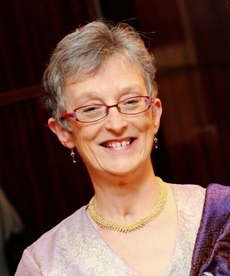Jenni, 65 – Retired manager & grandmother who developed chronic lung disease after a life-threatening episode of pneumonia, PERTH
 A severe episode of pneumonia in August, 1998, rendered then manager, who working in a State government department, Jenni, 48, Perth, comatose and literally fighting for life.
A severe episode of pneumonia in August, 1998, rendered then manager, who working in a State government department, Jenni, 48, Perth, comatose and literally fighting for life.
Her family members flew to Perth to be by her side, as doctors anticipated the worst. Yet remarkably, Jenni defied the odds, and survived the terrifying ordeal.
The now 65 year old retired manager and grandmother-to-two, developed chronic lung disease following her pneumonia infection, which rendered her with less than 50 per cent lung function and various other health complications.
This is Jenni’s story.
“I was a healthy 48 year old woman when I contracted pneumonia,” said Jenni.
“I had never smoked a day in my life, and I was working.
“I distinctly recall on the Monday that I was at work; on the Tuesday I fell ill and went to hospital; and on the Wednesday I was in intensive care. I developed pneumonia so quickly, and with so little warning,” Jenni said.
In August 1998, while working as a manager in a Government department, Jenni developed a cough, and suspected she may be developing the flu, but chose not to take time off work.
On Monday evening, Jenni found herself struggling to breathe, so she drove herself to hospital, where she was examined and prescribed some antibiotics.
Despite taking the antibiotics, Jenni felt much worse the following day. Overwhelmed by lethargy, weakness, severe pain on breathing, while coughing up a lot of coloured sputum, Jenni was struggling to breathe, to the point of almost collapse, by the evening.
Living on her own at the time, Jenni was unable to function. Fortunately Jenni’s neighbour visited her house to check on her welfare – which Jenni would later attribute to saving her life.
“I was really struggling to breathe and it was only getting worse.
“My neighbour visited me to see whether I was eating dinner. Instead, I asked him to take me to hospital – a request that basically saved my life,” Jenni said.
Upon arrival at the emergency department, Jenni had grown so weak, that she collapsed, was treated immediately, and admitted. The following day, she was transferred to the intensive care unit, where she remained for a month.
For the ensuing weeks, Jenni was comatose. She was placed on a ventilator to give her lungs a rest, but has limited recollection of this time. Despite intensive treatment with multiple antibiotics and other medications, her health continued to be of concern to the intensive care staff. The infection had spread from her lungs to her bloodstream. Her respiratory system began to fail. Other organs also came under threat. Her muscle tissue began to break down, and doctors discovered she was paralysed.
Extremely concerned for her welfare, Jenni’s doctors contacted her son, who was then studying in America at the time, and requested that he return home, along with her elderly mother, who lived in Port Macquarie, New South Wales.
“My son, who was studying at the University of California Berkley, was called home, because the doctors didn’t think I would survive.
“My mother, who was frail and elderly at the time, also flew from NSW to Perth to be by my bedside,” said Jenni. Despite her own health problems, she remained in Perth for three months until she felt I was able to cope alone,” said Jenni.
Remarkably, against all odds, Jenni managed to survive.
Several weeks after respiratory failure, and no longer comatose, Jenni became lucid, and subsequently commenced her long recovery from pneumonia. Because of the complicating paralysis, it took a long time before she could breathe unassisted.
Jenni spent a total of two months in hospital – the first four weeks in ICU, and the following month in the respiratory ward.
Upon arrival at home, Jenni spent another two months in recovery before returning to work, during which she received post- hospital rehabilitation and pulmonary rehabilitation program.
For Jenni, the fast and unexpected episode of pneumonia had a dire and long-term impact on her health.
“CT-scans have since confirmed that abscesses have destroyed some of the tissue of my lungs, leaving me with scarring and holes in some areas.
“I now have only 50 per cent lung function, but that’s a major improvement from when I was discharged from hospital,” Jenni said.
Jenni struggles with breathlessness whenever she moves. But exercise is pivotal to her well-being. Like others with permanent lung disease, she must make herself exercise in spite of feeling breathless. This includes just a short walk on flat ground.
In addition, she is unable to fly without the aid of an oxygen machine, and is at increased risk of chest infection.
“I have bronchiolitis obliterans, bronchiectasis and fibrosis, all caused by irreversible lung damage due to my episode of pneumonia,” said Jenni.
Today, Jenni is vaccinated against pneumococcal infection, and has regular doctor check-ups and age and health appropriate vaccinations when medically required.
“As soon as I had recovered from pneumonia, I spoke to my doctors and ensured I was vaccinated against pneumococcal pneumonia. I’ve kept my vaccinations up-to-date ever since.
“For anyone who is the least bit vulnerable to pneumonia, whether through age, chronic illness or race, I would definitely recommend vaccination to protect against pneumococcal pneumonia,” Jenni said.
“I would never wish pneumonia upon anyone. It is a devastating and painful infection.
“I’m only alive today due to healthcare professionals who worked so hard to save my life,” said Jenni.
